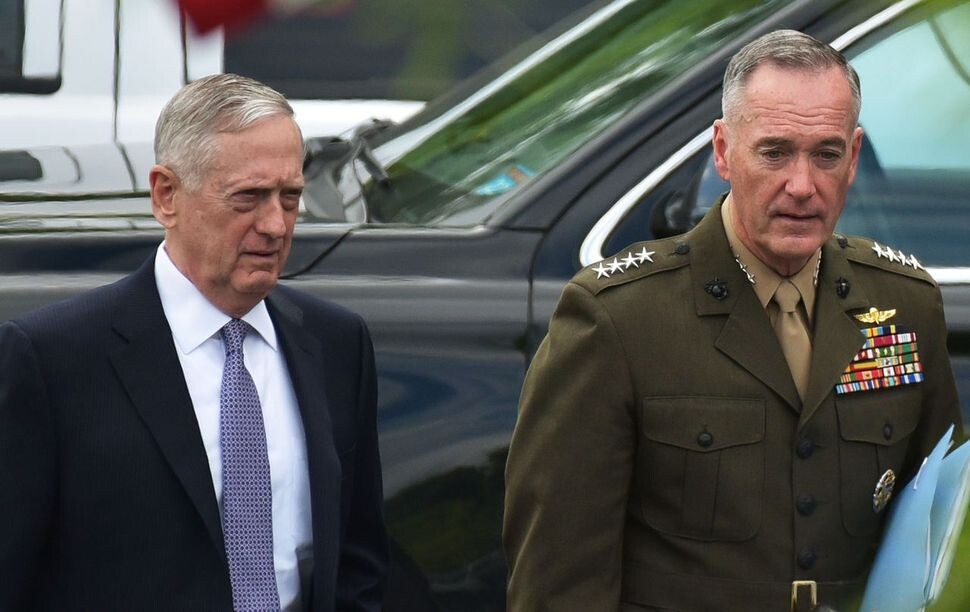hankyoreh
Links to other country sites 다른 나라 사이트 링크
[Editorial] South Korea needs to be the country preparing for dialogue with North Korea

The Korean peninsula is at a crossroads with a number of situations, including the North Korean nuclear crisis. On Apr. 26, US President Donald Trump held a closed-door North Korea policy briefing at the White House for Senators. Afterwards, three of his officials - Secretary of State Rex Tillerson, Secretary of Defense James Mattis, and Director of National Intelligence Daniel Coats - issued a joint statement calling North Korea’s pursuit of nuclear weapons “an urgent national security threat and top [US] foreign policy priority.” It’s considered unusual for the US executive and Congress to join in announcing North Korea policy.
The new focus in the Trump administration’s North Korea policy is summed up under the title “maximum pressure and engagement.” The idea is to apply as much as pressure as possible on Pyongyang to draw it into dialogue toward ending its nuclear program. The US executive has described its recent military pressure on the North as a means of achieving this. It’s worth noting the statement’s emphasis on “peaceful” denuclearization, and the omission of any reference to “all options,” which previously caused issues with its hints at possible military action against North Korea.
This means a greater chance that military confrontation, which reached its peak with the return of the USS Carl Vinson to waters near the Korean peninsula and North Korea’s threats of a nuclear strike, could at any moment give way to dialogue. It’s a positive sign in many ways. But at a time of governmental change in South Korea, it’s also worrisome in many ways.
Dialogue may be the stated aim, but there’s no question that military tensions could rise during the “pressure” process. And while the US and China may appear to finally be on the same page, it’s not clear to what extent Beijing is going to join in pressure on Pyongyang when its strategic interests are so different from Washington’s. That said, it is true that the possibility of suddenly shifting from the current crisis stage into a new one of dialogue is greater than before, now that the US has ruled out military action and brought out the negotiation card.
At a time when the peninsula’s situation is far more unpredictable than it’s been in the past, the role and commitment of the South Korean government as a stakeholder take on paramount importance. Seoul needs to talk to Washington and Beijing and help ease tensions on the peninsula, and it also needs to play the role of mediator, using inter-Korean dialogue to bring Pyongyang to the negotiating table. This may be the single most pressing task faced by the next South Korean administration.
But the US Defense Department and the transitional government of acting president Hwang Kyo-ahn, who has just two weeks left in his term, have now leaped into action by locking down the THAAD deployment in an ambush-like operation. The announcement that the missile defense system will immediately become operational is worthy of censure, limiting as it does the range of options for the next administration. It’s also truly unfortunate that the South Korean Ministry of National Defense only belatedly confirmed the plans for practical operation after they were announced at an Apr. 26 House Armed Services Committee hearing by US Pacific Command commander Adm. Harry Harris.
If Seoul keeps playing catch-up with Washington like this, it won’t be able to play any kind of leading role on Korean Peninsula issues even if negotiations do come to pass. Now that the Trump administration has announced its approach to North Korea policy, we need to get to work on concrete preparations for making dialogue happen with North Korea.
Please direct questions or comments to [english@hani.co.kr]

Editorial・opinion
![[Column] Park Geun-hye déjà vu in Yoon Suk-yeol [Column] Park Geun-hye déjà vu in Yoon Suk-yeol](https://flexible.img.hani.co.kr/flexible/normal/500/300/imgdb/original/2024/0424/651713945113788.jpg) [Column] Park Geun-hye déjà vu in Yoon Suk-yeol
[Column] Park Geun-hye déjà vu in Yoon Suk-yeol![[Editorial] New weight of N. Korea’s nuclear threats makes dialogue all the more urgent [Editorial] New weight of N. Korea’s nuclear threats makes dialogue all the more urgent](https://flexible.img.hani.co.kr/flexible/normal/500/300/imgdb/original/2024/0424/7317139454662664.jpg) [Editorial] New weight of N. Korea’s nuclear threats makes dialogue all the more urgent
[Editorial] New weight of N. Korea’s nuclear threats makes dialogue all the more urgent- [Guest essay] The real reason Korea’s new right wants to dub Rhee a founding father
- [Column] ‘Choson’: Is it time we start referring to N. Korea in its own terms?
- [Editorial] Japan’s rewriting of history with Korea has gone too far
- [Column] The president’s questionable capacity for dialogue
- [Column] Are chaebol firms just pizza pies for families to divvy up as they please?
- [Column] Has Korea, too, crossed the Rubicon on China?
- [Correspondent’s column] In Japan’s alliance with US, echoes of its past alliances with UK
- [Editorial] Does Yoon think the Korean public is wrong?
Most viewed articles
- 1‘We must say no’: Seoul defense chief on Korean, USFK involvement in hypothetical Taiwan crisis
- 2N. Korean delegation’s trip to Iran shows how Pyongyang is leveraging ties with Moscow
- 3[Column] Park Geun-hye déjà vu in Yoon Suk-yeol
- 4Amnesty notes ‘erosion’ of freedom of expression in Korea in annual human rights report
- 5‘Weddingflation’ breaks the bank for Korean couples-to-be
- 646% of cases of violence against women in Korea perpetrated by intimate partner, study finds
- 7[Reportage] On US campuses, student risk arrest as they call for divestment from Israel
- 8“Parental care contracts” increasingly common in South Korea
- 9[Interview] Dear Korean men, It’s OK to admit you’re not always strong
- 10Korean government’s compromise plan for medical reform swiftly rejected by doctors